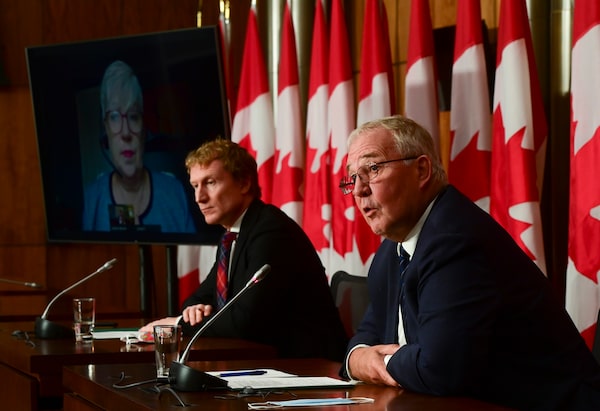Mi'kmaq lobster fisherman Andrew Robinson, left, guides a boat away from the wharf before leaving to check traps in Saulnierville, N.S., on Oct. 19, 2020, where members of the Sipekne'katik First Nation are exercising their treaty right to earn a moderate livelihood fishing lobster.Darren Calabrese/The Globe and Mail
Dozens of anxious Indigenous fishermen and their crews continued to head out on the water from a wharf in Saulnierville Monday, as federal ministers in Ottawa condemned the recent violence against them.
All day long, the Mi’kmaq boats came and went, vowing to continue fishing despite recent attacks that Indigenous Services Minister Marc Miller called disgusting, unacceptable and racist.
One of the Mi’kmaq fishermen, Levi Paul Sr., said he’s worn out from all the tension and fighting that has torn his province apart. He hopes that his teenaged children can one day follow their father and earn a living on the sea.
But he will not allow them to work by his side at the Saulnierville wharf, not right now.
Mi’kmaq fisheries under attack: The story in Nova Scotia so far, and the treaty rights behind it
Nova Scotia restaurants boycott lobster in support of Mi’kmaq self-regulated fishery
Resolving Nova Scotia’s fishery conflict will require inviting both sides to the negotiating table
“It’s too dangerous,” he said, loading empty lobster traps onto his boat, the Sea Bug. “My kids are so scared of what’s going on. My son, he’s 17 and he wants to be here right now, but I can’t let him because of all this. When is enough, enough?”
An uneasy quiet has settled in here after a week of violence in which mobs ransacked two local lobster pounds, vehicles were torched and a fish plant burned to the ground. Leaders from Sipekne’katik First Nation, which launched its own fishery outside of the federally regulated season a month ago, say they’re trying to keep their own people from retaliating.
On the road leading to the wharf, a new RCMP checkpoint has sprung up, and a police boat patrols the bay, along with officers from around the Maritime provinces who have been brought in to keep protests from growing violent again. Mi’kmaq supporters control another roadblock made of lobster traps and rope that controls access to the docks.
In Ottawa, where the dispute prompted an emergency debate in the House of Commons Monday night, Mr. Miller said his government pledged to ensure the Mi’kmaq’s constitutionally recognized rights are upheld.
RCMP officers maintain a checkpoint at the wharf in Saulnierville, N.S. on Oct. 19, 2020.Darren Calabrese/The Globe and Mail
The fight over fishing rights has caused rifts up and down Nova Scotia’s southwestern Acadian coast, where many families have fished for generations, and pushed more East Coast restaurants to pull lobster from their menu. Mr. Paul said he just wants to earn a modest living – he doesn’t want to battle with fellow fishermen who until a month ago docked side-by-side here, and he doesn’t want a “free handout” from the government.
At a lobster pound in New Edinburgh, where some of the Sipekne’katik lobster was being stored, young Mi’kmaq men from Cape Breton said they were prepared to do whatever it takes to protect their treaty rights. Businesses that supply the fishing industry also say they’ve been threatened with boycotts if they work with the Mi’kmaq fishermen.
“You feel like you’ve always got a knot in your stomach,” said Gerry Augustine, who has one of Sipekne’katik First Nation’s 11 lobster licences. “It’s just constant worry, to be honest. I’m jumpy, I’m not eating, I’m not sleeping.”
There are frayed nerves on the other side, too, says Chris D’Entremont, the Conservative MP who represents the riding of West Nova. He condemned the violent attacks and anti-Indigenous slurs being spread on social media, but said most of the fishermen have been unfairly painted as racists. He argues the heart of the dispute is really about an economic concern – lobster fishermen are worried about the introduction of a new fishery that can negatively affect the prices they get for their catch.

Bernadette Jordan, Minister of Fisheries, Oceans and the Canadian Coast Guard, Bill Blair, Minister of Public Safety and Emergency Preparedness, and Marc Miller, Minister of Indigenous Services, hold a news conference in Ottawa on Oct. 19, 2020.Sean Kilpatrick/The Canadian Press
“People don’t like change, and they’re of course going to fight for their livelihood,” he said. “But our inability to sit down and actually talk this out is actually hurting the industry as whole. Right now, we need to take the tension down a notch.”
Commercial fishermen have complained for years the rules that allow Indigenous people to fish out of season for food, social and ceremonial purposes has fuelled a out-of-control black market for lobster in Nova Scotia, Mr. D’Entremont said. They feel the federal Department of Fisheries and Oceans has ignored their concerns, and now they’re being shut out of negotiations on a new lobster fishery with undefined limitations that will further affect their incomes, he said.
“They want to be a part of discussions on the future of their industry,” the MP said, arguing most fishermen support a moderate livelihood fishery, but one that operates within the regular fishing season, and only for Indigenous people who live in that area.
On Monday morning, hundreds of commercial fishermen rallied outside a DFO office in Barrington Passage, N.S., calling for a one-year pause on the Mi’kmaq fishery while the rules around it are established. They warned against the creation of a “two-tiered” lobster fishing system.
Mr. Miller joined three fellow cabinet ministers for a news conference on Monday, saying they wanted to address the “disgraceful” and “alarming” events that have unfolded recently. Every person in Canada, whether Indigenous or non-Indigenous, must be able to feel safe in their home communities and be able to earn a living to support their families, he said.
Mi'kmaq lobster fisher Andrew Robinson unties from the wharf before leaving to check traps in Saulnierville, N.S., on Oct. 19, 2020.Darren Calabrese/The Globe and Mail
“It is a disgrace to see these threats and acts of intimidation and violence take place in this country,” he said.
Under the Supreme Court of Canada’s Marshall decision, the Mi’kmaq have a constitutionally protected right to fish in pursuit of a moderate livelihood, he said, adding Ottawa will continue to uphold that right.
Fisheries Minister Bernadette Jordan has also called for peace while discussions take place with First Nations and fish harvesters. She also said the violence, fires and destruction of property in the past week is “disgusting.”
“And it is not the Nova Scotia I know and love,” she said.
Indigenous people have been let down by police who are sworn to protect them, Mr. Miller added, while he stressed the need for peace to move toward. “Clearly that has not been the case up to now.”
The federal government and the RCMP have faced questions in recent days including concerns about the response by the national police force to escalating violence.
Public Safety Minister Bill Blair said Monday police must be fair and impartial in the exercise of their duties, but that when crimes are committed and people are victimized the police can “never be impartial to that.”
“They have a responsibility to act,” he said.
He said the RCMP are investigating and laying charges for those who commit acts of violence. He also said RCMP Commissioner Brenda Lucki has assured him that she understands this responsibility as well.
In Question Period on Monday, Conservative Leader Erin O’Toole said that Conservatives have been warning the government about rising tensions in Nova Scotia for a month.
“The Minister of Fisheries has refused to take her responsibility to Indigenous and commercial fisherman seriously,” he said. “Instead of sending in negotiators a month ago, the government has to send in police officers.”
Ms. Jordan said Friday that she and Crown-Indigenous Relations Minister Carolyn Bennett will be naming a ministerial representative to foster conversations between First Nations and commercial harvesters so “all sides are heard.”
Senator Murray Sinclair, who chaired the Truth and Reconciliation Commission that probed Canada’s residential school legacy, said in an interview on Monday that he had recommended the use of a ministerial representative.
He also urged the Prime Minister in a letter on the weekend to ensure laws were being upheld and enforced by the RCMP.
Mr. Sinclair said there are not two sides of the dispute, but rather one-sided “acts of terrorism.”
“That’s what we need to recognize ... it is not like the Mi’kmaq are at war with the commercial fishers. They are not. It’s the commercial fishers that are attacking the Mi’kmaq.”
Our Morning Update and Evening Update newsletters are written by Globe editors, giving you a concise summary of the day’s most important headlines. Sign up today.
 Greg Mercer
Greg Mercer Kristy Kirkup
Kristy Kirkup